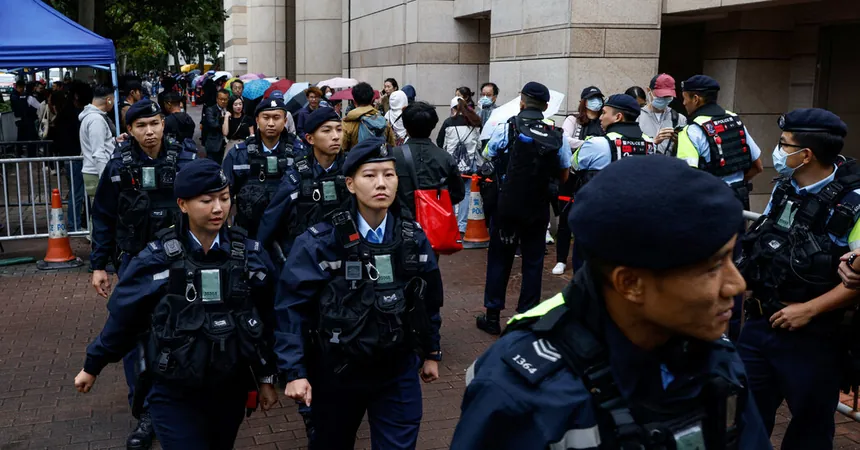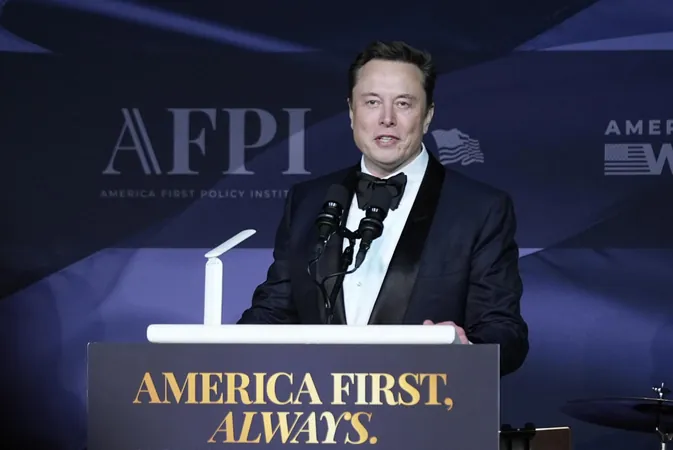
Shockwaves in Hong Kong: 45 Pro-Democracy Leaders Sentenced in Landmark Trial!
2024-11-19
Author: Ming
In a stunning display of judicial power, a Hong Kong court sentenced 45 influential pro-democracy leaders on Tuesday in a sweeping trial that signals a grim reality for opposition figures in the city. This mass sentencing has dealt a catastrophic blow to the remnants of Hong Kong's once-flourishing democratic movement, serving as a dire warning against dissent in the face of Beijing's stringent control.
Background of the Trial
This landmark trial is the most significant application of a national security law implemented by Beijing in 2020, a direct response to widespread protests advocating for democratic freedoms. Observers have labeled the prosecution of these activists as potentially the final blow to aspirations for democracy within the city.
Details of Charges and Sentencing
The charges leveled against these politicians were centered around their involvement in an unofficial primary election, an act that the government deemed a direct threat to its authority. In an unprecedented crackdown in 2021, high-profile figures including legal scholar Benny Tai and young activist Joshua Wong were among those arrested, highlighting the state's relentless pursuit of perceived subversion.
Benny Tai received a hefty 10-year prison sentence, while 20 other prominent opposition members, involved in the primary organization, drew sentences ranging from five to nearly eight years. Joshua Wong, alongside 24 other activists, faced terms of just over four to under five years.
Expert Opinions
Experts assert that this trial underscores the immense risks associated with any critique of the government, no matter how slight. Political scientist Steve Tsang warns, "If you voice any criticism of the authorities in Hong Kong or China, it’s open season on you."
Reactions to the National Security Law
While the Communist Party of China defends the national security law as necessary to eliminate threats to its governance, activists and international observers contend that it has drastically undermined Hong Kong's judicial independence, once a hallmark of its legal system. The ramifications of this trial further illuminate the erosion of freedoms that Hong Kong citizens once enjoyed.
Courtroom Dynamics
To accommodate the large number of defendants, the courtroom employed a so-called "mega courtroom," with long benches and glass partitions separating the accused from the public. The absence of a jury, with cases being heard by judges appointed by the mainland-influenced local leadership, has drawn criticism regarding the fairness of the judicial process.
Prosecutors' Allegations
Prosecutors accused the defendants of "conspiracy to commit subversion," asserting that the primary election held in 2020 aimed to disrupt the current political ecosystem. The pro-democracy camp argued that this electoral effort mirrored legitimate democratic practices found worldwide, with over 600,000 voters participating in a bid to enhance their influence in the legislative council.
However, their plans were thwarted as the elections were postponed and many candidates arrested. Tai, viewed as the mastermind of the electoral strategy, became a central figure in the prosecution's case, while other defendants included veteran lawmakers and activists – each facing years of imprisonment for their commitment to democratic ideals.
Personal Perspectives
Despite the looming possibility of extended prison sentences, some of the accused expressed relief at the conclusion of a trial that had kept their lives in a state of uncertainty. Emilia Wong, whose boyfriend Ventus Lau has been detained, reflected on the harsh reality of prison life: "It's not just the confinement; it's the painful disconnection from loved ones and society."
Conclusion
As Hong Kong now grapples with the implications of this mass trial, many observers wonder if this marks the ultimate demise of the rule of law in the city. The international community watches closely, as the outcomes of these trials may redefine the landscape of political freedom in Hong Kong and beyond.

 Brasil (PT)
Brasil (PT)
 Canada (EN)
Canada (EN)
 Chile (ES)
Chile (ES)
 España (ES)
España (ES)
 France (FR)
France (FR)
 Hong Kong (EN)
Hong Kong (EN)
 Italia (IT)
Italia (IT)
 日本 (JA)
日本 (JA)
 Magyarország (HU)
Magyarország (HU)
 Norge (NO)
Norge (NO)
 Polska (PL)
Polska (PL)
 Schweiz (DE)
Schweiz (DE)
 Singapore (EN)
Singapore (EN)
 Sverige (SV)
Sverige (SV)
 Suomi (FI)
Suomi (FI)
 Türkiye (TR)
Türkiye (TR)